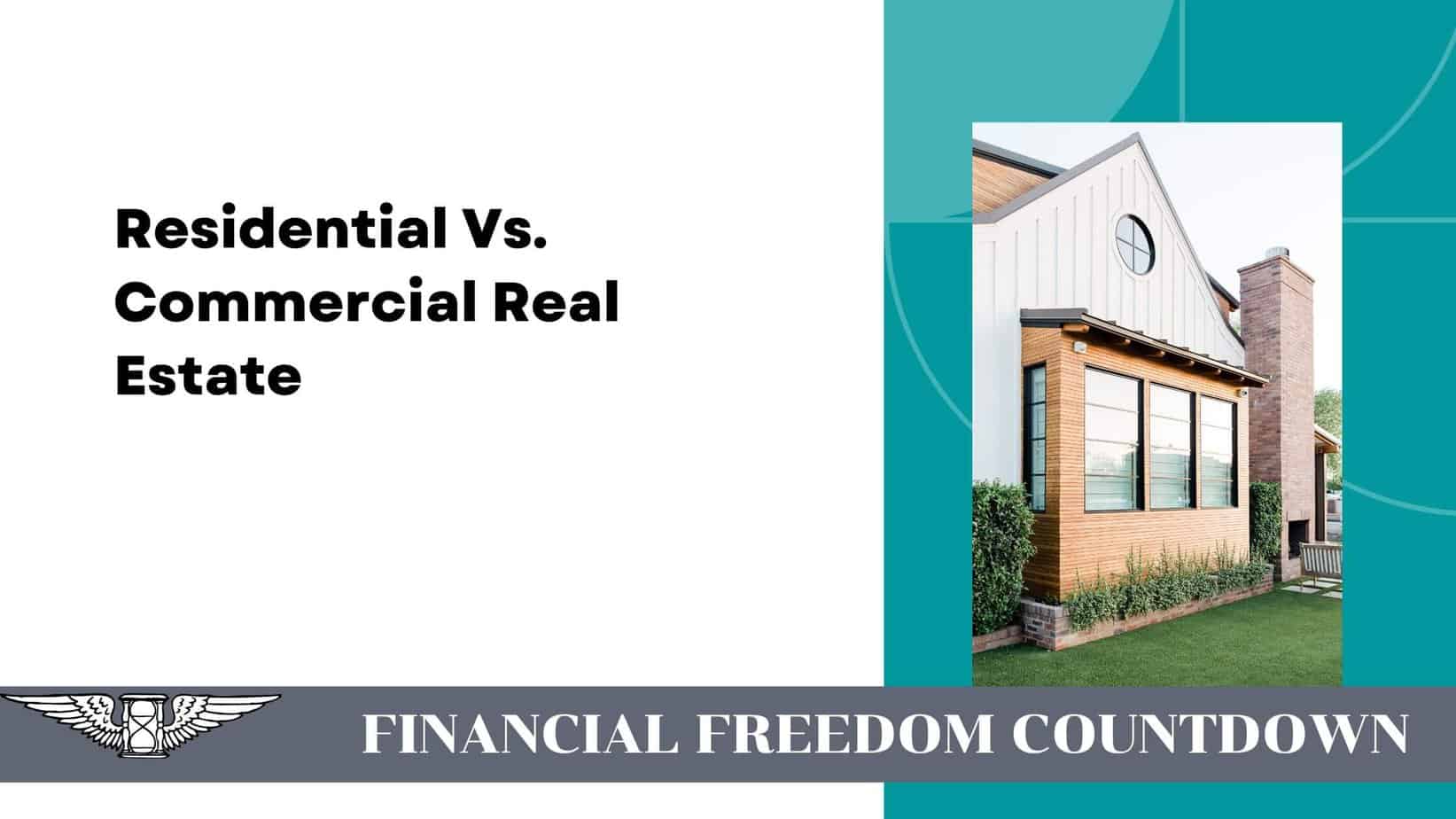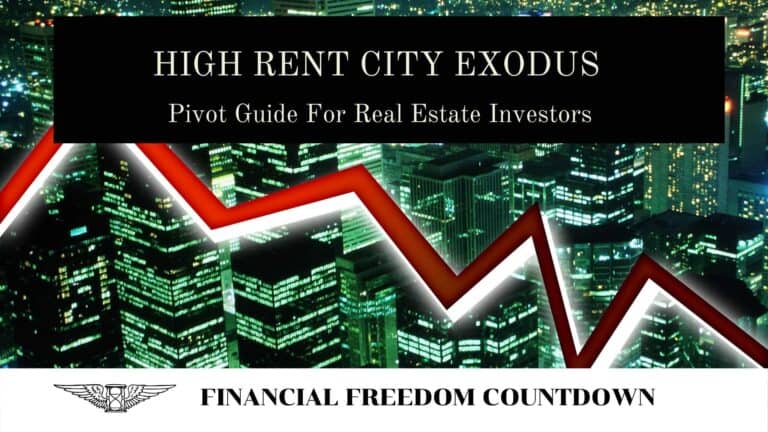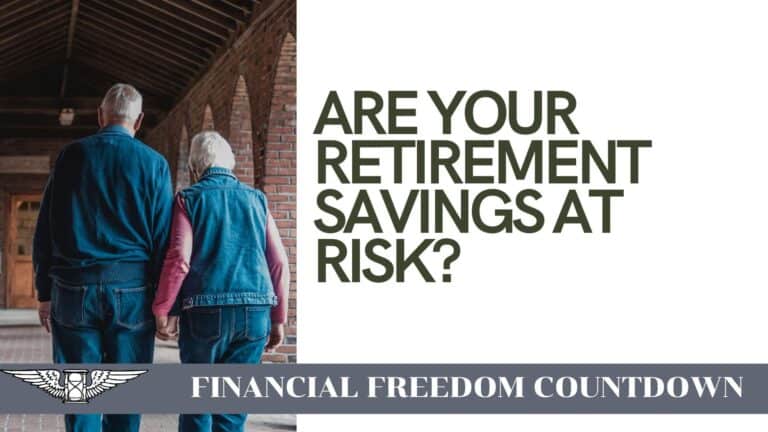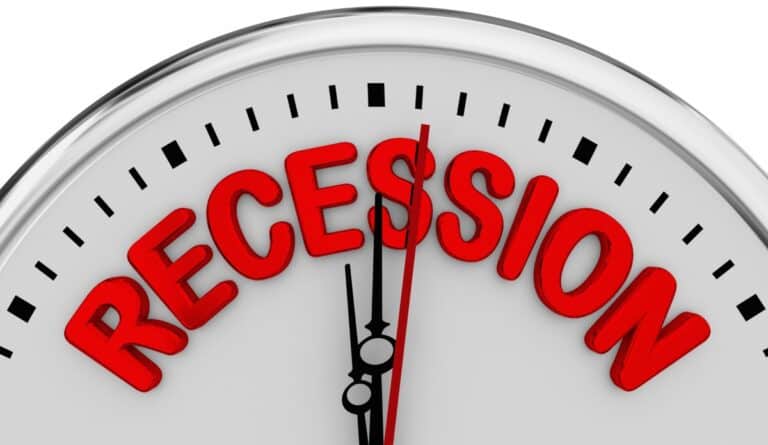Residential vs. Commercial Real Estate: How To Choose

Real estate investments have become very popular, turning many casual investors into real estate investors. The real estate market is taking off, and home prices continue increasing, making it one of the best income-producing assets.
When it comes to real estate investing, you have many options. Indeed, there are significant differences in this asset class, with many differences between commercial and residential real estate.
Learning how to invest in an option that works for you involves understanding the differences between residential vs. commercial real estate, financial goals, and available time and expertise.
Residential Real Estate Market
Residential properties are properties that people live in and are between one to 4 units.
These properties provide interested individuals with plenty of potential investment opportunities. Residential real estate property comes in wide varieties. These include new construction or purchasing:
- Single families homes
- Multifamily properties such as duplexes, triplexes, or quadplexes
- Townhomes
- Condominiums (condo)
- Cooperatives (co-op)
- Mobile homes
Everyone is part of the residential market as an owner or a renter. As a result, residential real estate is familiar to millions of Americans who engage in some residential real estate investing.
Most Americans who invest in this market begin by buying a primary home. At some point, they rent out the house they live in due to job factors, changing home ownership preferences, or family circumstances. The numbers might not always be favorable with this approach.
More methodical people would purchase a residential property after studying how to evaluate rental properties. They would then find residential tenants who pay rent to them. This money is used to repay the mortgage and make value-added real estate improvements. A portion of it ultimately finds its way into the owners’ wallets making real estate one of the top choices for investments providing monthly income.
Depending on various factors, a residential property can ultimately be a significant financial boon for investors. This type of real estate investing has been used for centuries to create a solid investment for owners.
Typically, property owners will use residential leases to lock in rent payments, expectations, and eviction procedures for potential tenants. It allows them to have some stability and assurance that they will receive rent money from properties.
Of course, residential rentals are not the only way that a prospective property owner can potentially turn a residential property into real money.
A real estate investor often purchases a residential property and sells it immediately. This type of residential property investing is referred to as flipping houses. It means someone buys a “fixer-upper” residential property and repairs it, often increasing the appeal and overall value of the property.
When this happens, residential property owners often act as their own residential real estate agents, using their connections and experience to locate contractors and put a home back on the market.
This type of residential investing can be risky. Property may need more repairs than initially thought, or it may have trouble selling for several reasons, including sudden economic changes such as a recession.
A safer bet for potential residential real estate investors is to purchase a property like a single-family home and turn it into a rental property. Or go for a hybrid approach using the BRRRR method.
At the moment, residential real estate is still a scorching market. For various reasons related to inflation and demand about work from home, home inventory – meaning the number of properties available on the market – is very low. The laws of supply and demand have kicked in, raising the prices of all homes and making very wealthy people out of individuals who started residential real estate investing early.
There are signs that the residential real estate market may slow down. After years of low-interest rates, rate hikes have started, and more are expected. It will unquestionably drive up the cost of a mortgage and slow the ability of individuals to borrow the money to own a home, lowering prices.
However, rising inflation may help drive up the price of a rental property: If people cannot afford a home, they are more likely to need a rental. And if more people are willing to rent properties, landlords will be able to afford to raise prices, making it an excellent inflation hedge.
Commercial Real Estate Market
Commercial real estate properties are properties with more than four units used for living purposes or any property used for business.
The commercial real estate market is vast, and commercial real estate investors have ample opportunity to invest in a wide array of properties that serve their needs. Commercial real estate consists of the following types of properties:
- Retail properties
- Manufacturing properties in greenfields
- Developing mixed-use properties
- Warehouses
- Data centers
- Self-storage units
- Hotels
- Residential homes with five or more units
- Homes that have been converted into apartments.
- Apartment buildings or apartment complexes.
Commercial properties tend to gain value over time. In this regard, they are very similar to residential homes. However, a savvy commercial real estate investor has to understand an entirely different market than the residential one, as there are very different market pressures, commercial real estate loans, lease structures, and more. It helps to explain why commercial vs. residential real estate are largely separated and why there are such different markets for each type of property.
First, it is essential to realize that commercial properties are not one massive monolith in terms of sections of the real estate economy. There are very different pressures for commercial properties. Commercial real estate investing has seen significant changes in demand in other areas of the world or even a community.
Indeed, one only needs to consider current events for proof of this. The pandemic has shifted more and more people to work from home, dramatically altering both residential real estate and commercial real estate.
Many apartments began to add spaces for home offices, even if they weren’t initially designed for it. At the same time, the office vacancy rate shot through the roof, with more and more companies realizing that they could save money and have their employees work from home.
Residential vs. Commercial Real Estate Loans
One of the significant differences between residential vs. commercial real estate is funding.
The best way to get funding for residential real estate is to buy a duplex, triplex, or fourplex as a primary residence and “house hacking.”
Living in one unit and renting out the other units is perfectly acceptable. In fact, the expected rent from other units is used as income when lenders calculate the debt to income (DTI).
The number of units in a property drives the financing eligibility matrix by Fannie Mae and is the primary reason residential units are classified as four or fewer units. There are many government-backed forms of residential loans. These loans make it easier for millions of Americans to take out a mortgage and ultimately buy a rental property
A commercial loan is typically more challenging than residential real estate. Indeed, when it comes to commercial real estate, an investor or property owner generally is at the mercy of market conditions and whatever they can get in terms of financing from a bank. This makes initial entry into commercial real estate much more difficult.
Also, agency or bank-funded commercial loans have a shorter repayment period of three to 20 years compared to residential mortgages of 30 years. Hard money lending is one option to ensure commercial property investors obtain flexibility in the loan terms and duration.
Savvy investors skilled in raising capital for real estate projects can obtain better commercial financing terms. A fair and well-defined real estate waterfall equity structure is critical in a real estate syndication.
But not so fast. As noted above, it is easier for the average person to get involved in residential real estate. This is because there is more opportunity, more tenants, and fewer barriers to entry. Residential property development also tends to be more affordable. In many cases, residential properties have simply been passed down from generation to generation, creating generational wealth. It means that someone can own residential real estate without paying a dime.
This can also happen with commercial real estate, but it is far less likely. Commercial real estate investment is much more expensive.
Residential vs. Commercial Real Estate Build
A commercial building is also not as easy to construct as a residential one. In most cases, residential real estate follows a similar pattern, and it can be relatively easy to discern market demand for what type of property a potential investor wants. Of course, this isn’t always the case, but it is more often for residential homes than commercial development.
However, a commercial real estate property is very different. The construction of such a building – including its overall design and costs – ultimately vary broadly based on the type of commercial tenants interested in renting the property.
There are so many different types of commercial tenants, and many possibilities exist for what commercial building gets built.
Residential vs. Commercial Real Estate Leases
Residential leases are often relatively short, with even the most extended lease lasting no more than a year. Tenants may even want shorter leases: The market may support short-term rentals but at a premium.
A commercial lease tends to last longer, as commercial entities typically want stability in their operations and to know that they are settling down in a place for an extended period.
Finally, there are many types of commercial leases. Commercial leases tend to incorporate a variety of factors, including rental, real estate taxes, insurance, and more.
The most common types of leases are triple net leases. Triple net leases are more than just the rental price: They also incorporate property taxes, insurance, and maintenance costs. Triple net leases allow a property owner to pass all property costs to a tenant. A commercial real estate agent will usually help tenants determine if a property is worth paying for such a lease.
Small business owners looking to open a small retail shop may not find NNN leases appropriate. They are almost expected for major corporate chains moving into Class A office space.
Residential vs. Commercial Real Estate Tenants
There are other challenges within the residential world. Residential tenants are more likely than commercial ones to create long-term property issues. They are more likely to damage property or entirely skip town, leaving a landlord holding the bag for their payment.
A significant reason why long-distance real estate investing should involve a local property management company.
That’s not to say that this doesn’t happen within commercial real estate, but it is less likely. It is much harder for a business to disappear than for an individual or a family.
Economic Conditions Impacting Residential vs. Commercial Real Estate
You also have to consider the impact of economic volatility on commercial real estate vs. residential real estate. The most recent recession – driven by the pandemic – devastated large commercial real estate market swaths. Indeed, some sections of the economy still have not entirely recovered.
However, paradoxically, it likely helped the residential real estate market and made residential real estate investing much more profitable.
Ironically, the prior downturn had the opposite impact. The Great Recession was primarily driven by a massive market crash in residential properties. It saw property value crash in almost every real estate market segment, but particularly harsh regarding its impact on residential property.
Based on economic conditions, it can be challenging to tell what the future will bring to residential or commercial real estate. Each downturn is different, and investing during a recession is always challenging.
So, what’s the conclusion here? Be careful what you wish for, and prepare yourself for real estate investment risks if you want to get involved in investing. Residential and commercial real estate have severe drawbacks and general concerns that you must pay attention to.
Indeed, residential and commercial property will both perform very differently in times of a booming economy and times of a more struggling one. As such, you should diversify your real estate portfolio however you can.
Similarities in Residential vs. Commercial Real Estate
In residential and commercial property investment, you will have expenses, regardless of how or what you invest.
- Property taxes are based on the level of property taxes in your community. Different states have different structures for property taxes, and these taxes usually increase in the long run. Hence, you must develop a solid understanding of property taxes and how they will likely move. California is not among the best states for real estate, but property tax increases are capped due to Prop 13.
- Property management costs may include upgrade, maintenance, and staff-related costs for maintaining the property. If you opt for a turnkey property, the expense is baked into your cash flow. If you self-manage, then QBI deduction for rental properties could be a possibility.
- Mortgage or the cost of repaying your investors.
- Insurance.
- Marketing and lease-related costs may be necessary to properly market the property and fill it with a high-quality, reliable tenant.
How To Invest in Residential Real Estate
There are several ways to invest in residential real estate. Unlike commercial real estate, investing in residential real estate with little or no money is entirely possible.
Upgrade Primary Home
Buying a primary home to live in is the best way to get started in residential real estate investing. Determine if now is a good time to buy a home based on your budget and liquid net worth.
After a year of living there, buy another house and rent your current home. The advantage of this approach is that your starter home still has a low “owner-occupied mortgage rate” Depending on your cash flow, this approach can work better with a 15 vs. 30 year mortgage.
BRRRR
The BRRRR method is a real estate investment technique in which you purchase a distressed property, fix it up, rent it, cash out refinance it to fund your next BRRRR rental investment property. The acronym stands for Buy, Rehabilitate, Rent, Refinance, Repeat.
Pay attention to the current and future mortgage rates to answer the “should I refinance my mortgage” question.
House Hacking
If you do not mind living close to your tenants, house hacking is another approach that doesn’t involve a lot of money. You could rent a room in your house or buy a duplex and rent the other unit. You could also construct an accessory dwelling unit (ADU) on your lot.
Neighborhood Self Storage
Renting out unused space in your garage is a great way to generate extra income and avoid any 2 am tenant emergency calls. A form of house hacking that affords you privacy since the extra space is only used for storage. It will also help you understand the self-storage real estate market.
Sign up for Neighbor and get paid to store things. You can earn $100-$400 per month as passive income with unused space. You get to pick WHO, WHAT, and WHEN items are stored. And the platform comes with $1,000,000 host liability protection.
You list your space for free, review the renter’s request (including what and when they want to store it), and approve as per your criteria.
A garage, RV pad, closet, empty lot, shed, and basement can all be listed as available rental space.
Turnkey Property
If you want to avoid long-distance real estate investing, consider Turnkey properties.
A turnkey property is a structure like a home, duplex, or apartment that an investor can purchase and is ready to rent immediately.
Roofstock is an online marketplace for tenant-occupied single-family homes—many of which are pre-inspected, come with a tenant in place, and generate cash flow. Some even offer vacancy protection or a 30-day money-back guarantee.
Note Investing
The buy-and-hold strategy of performing real estate note investing involves an investor buying mortgage notes from the lender. The payments would therefore be a source of real estate passive income for the investor.
Most note investing opportunities are restricted to investors meeting the accredited investor qualifications.
PeerStreet has several debt options on its platform where you essentially provide hard money loans for others to buy the property. The advantage of PeerStreet is that you can filter debt deals by Loan To Value (LTV) and also stressed LTV. PeerStreet has a low $1,000 minimum and has an optional automated investing feature that automatically places you into investments that match your criteria.
I use Automated Investing since the good deals are filled within minutes on their platform. PeerStreet also allows investors to review the performance of every past investment, which is helpful for due diligence.
REITs
Real estate investment trusts (REITs) are a great way to start real estate investing passively with a high level of diversification. REITs own, operate, or finance income-producing real estate across many property sectors.
You benefit from diversification across several properties with REITs for relatively smaller amounts. You can buy publicly-traded REITs using no-fee platforms like M1 Finance for as low as $10. Check out my M1 Finance review for more details on dollar-cost averaging your REIT purchases.
The large fund families like Vanguard, Schwab, and Fidelity all have Real estate index ETFs trading under the following ticker symbols – VNQ, SCHH, and FREL, respectively.
Real Estate Crowdfunding
Real estate crowdfunding provides opportunities for investors to get involved with commercial properties. Crowdfunding allows several investors to pool their money together and buy a real estate investment property with the contributed pool.
Fundrise: Most real estate crowdfunding platforms are restricted to only accredited investors. Fundrise’s unique structure permits equity crowdfunding for accredited and non-accredited investors. Also, Fundrise has one of the lowest minimums (only $10 for the Fundrise Starter Portfolio and $1,000 for the Basic level).
How To Invest in Commercial Real Estate
Investors interested in participating in commercial real estate but don’t have the money to buy commercial property or don’t want to own physical property can also profit without getting a mortgage and buying a property. Those investors can find an alternative investment to owning property.
Commercial Property Individual Stocks
Instead of REITs which contain several stocks, you can curate your basket of individual stocks. Some of the common ones in the commercial property space are
- Simon Property Group Inc (SPG) invests in retail properties and pays a 6.75% dividend yield.
- Paramount Group Inc (PGRE) invests in office buildings and pays a 4.40% yield.
- Prologis (PLD) invests in distribution centers and other development projects and pays a 2.52% yield.
- Equinix (EQIX) specializes in the data center market and pays a dividend yield of 2.09%
Investors can dollar cost average (DCA) into commercial property stocks using M1Finance, a no-fee platform that automates everything from investing to rebalancing for free. You can read my M1Finance review on how to set up pies to invest.
Commercial Property Exchange-Traded Funds
An exchange-traded fund (ETF) is a fund you can buy on the stock market. These funds hold a mixture of stocks and bonds of commercial property stocks and are more commonly known as REITs. That is a great way to maintain a diversified mix of commercial property companies and profit for much less capital than buying the actual property would cost.
A commercial property ETF is liquid and can easily be bought and sold on the market. With an ETF, investors are not buying into just one commercial property project but numerous projects.
This type of diversity protects investors if one of the projects fails. Investors invest in real estate companies’ stocks and investment trusts (REITs). These ETFs also pay a dividend, so investors will earn money while they own shares of these funds. Some of the best commercial property ETFs include:
- iShares U.S. Real Estate ETF (IYR) – 2.32% dividend yield
- First Trust S&P REIT Index Fund (FRI) – 2.0% yield
- iShares Core U.S. REIT ETF (USRT) – 2.47% yield
- iShares Cohen & Steers REIT ETF (ICF) – 2.22% yield
- Invesco S&P 500 Equal Weight Real Estate ETF (EWRE) – 2.74% yield
- Vanguard Real Estate Index (VNQ) – 3.07% yield
Investors can buy publicly traded REITs using M1Finance, a no-fee platform that automates everything from investing to rebalancing for free.
Commercial Property Mutual Funds
Mutual funds are similar to exchange-traded funds because they also hold a basket of stocks and bonds of commercial real estate companies. Many mutual funds come with a load fee, which can be a front-end load fee, a back-end load fee, or both. These costs can eat into the profits you make. There are some tax differences between exchange-traded and mutual funds, so make sure to do thorough due diligence before investing in them.
Commercial Property Private REITs
Besides REITs traded on stock exchanges, private commercial REITs are also available to investors. Some of the most accessible ones are crowdfunded investments for non-accredited investors.
The advantage of private REITs is the ability to invest in specific real estate market sectors where one may not have the expertise. Private REITs can be tailored towards investing in apartment buildings, mobile home investing, self-storage investing, and several niche areas.
Streitwise offers a fund structure and is available for accredited and non-accredited investors. They have one of the lowest fees and high “skin in the game,” with over $5M of capital invested by founders in the deals.
Commercial Property Syndication
Real estate syndication is a new and exciting way for investors to get involved in commercial real estate investing.
Investors get to choose which projects they want to participate in and where. If an investor is interested in a specific type of commercial property, they can invest in only those projects. Investors interested in certain cities can invest in only those cities.
EquityMultiple gives accredited investors direct access to individual commercial property with a minimum of only a $5,000 investment.
CrowdStreet is a commercial real estate investing platform for accredited investors. It has a higher minimum of $25,000 per deal. CrowdStreet offers both single-property investments and multi-property funds, as well as both equity and debt deals.
Groundfloor is another platform where property debt notes have yielded around 10% annual interest over the past eight years.
Summary of Residential vs. Commercial Real Estate
So, what’s a better investment? Will commercial real estate or residential real estate get you a higher profit? Of course, there is no set answer to that, and the answer depends on what better fits your skill set, financial resources, and desire to take the risk.
There is no question that you can become a real estate investor, even with relatively little money, as there are numerous potential investment vehicles. When done right, both forms of investing can provide multiple tax benefits, cash flow, access to equity, and rental income. Both can allow you to work with others and help people fulfill their dreams of home or small business ownership. And both can make you rich.
Residential investors tend to be easier to start and give regular people more opportunities to understand their investment. Because everyone interacts with the residential market in some way, residential real estate investors typically have a broader and more intuitive understanding of what this market is, how it works, and how they can gain money.
It is easier to understand property taxes, property values, why insurance premiums cost what they do, and more. However, there will always be opportunities within the commercial real estate world, particularly for savvy investors who know the market.
At the same time, there are serious risks associated with each type of investment. That’s why you must conduct a comprehensive overview of your finances – preferably in conjunction with a financial planner who understands your resources and assets – and determine the suitable investment for you.
Spend time educating yourself and reading some of the best books for real estate investors.
Regardless of your investment, it is essential to understand the risks and the potential rewards.
Investing in commercial or residential real estate can provide a steady stream of passive income, helping pave the way to someone’s long-term financial freedom. Even in an economic downturn, good investors can thrive, which helps make real estate investing a wise potential investment choice.

John Dealbreuin came from a third world country to the US with only $1,000 not knowing anyone; guided by an immigrant dream. In 12 years, he achieved his retirement number.
He started Financial Freedom Countdown to help everyone think differently about their financial challenges and live their best lives. John resides in the San Francisco Bay Area enjoying nature trails and weight training.
Here are his recommended tools
Personal Capital: This is a free tool John uses to track his net worth on a regular basis and as a retirement planner. It also alerts him wrt hidden fees and has a budget tracker included.
Platforms like Yieldstreet provide investment options in art, legal, real estate, structured notes, venture capital, etc. They also have fixed-income portfolios spread across multiple asset classes with a single investment with low minimums of $10,000.




